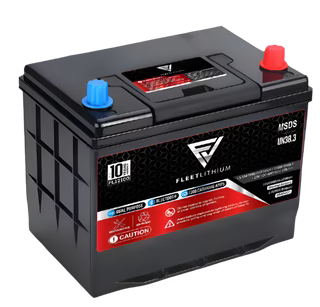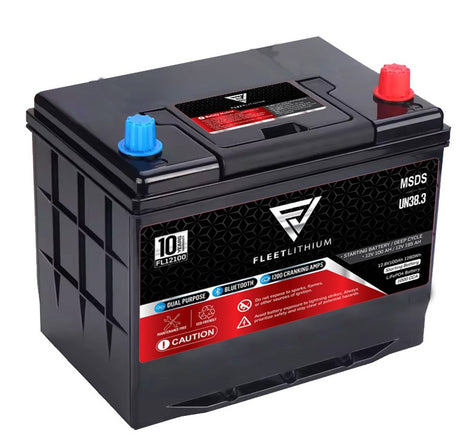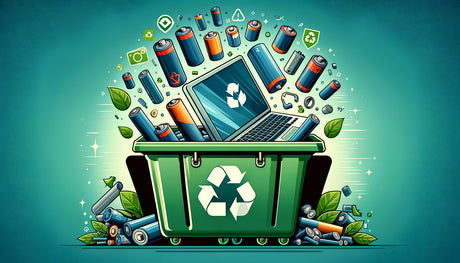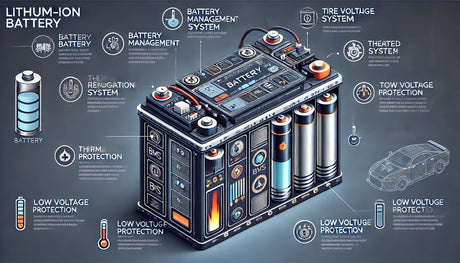Lithium-ion batteries have revolutionized energy storage across a range of industries, from electric vehicles (EVs) to solar energy systems and consumer electronics. Their superior energy density, longer lifespan, and lighter weight make them the preferred choice for powering modern technology. However, like any technology, lithium batteries come with their own set of challenges that need to be addressed to ensure their long-term sustainability.
In this post, we’ll explore both the pros and cons of lithium batteries and how Fleet Lithium is working on innovative solutions to mitigate the potential drawbacks while maximizing the benefits.
Pros of Lithium Batteries
1. High Energy Density
Lithium-ion batteries are known for their exceptionally high energy density compared to other types of batteries, such as lead-acid or nickel-cadmium batteries. This means that lithium batteries can store more energy in a smaller, lighter package, providing more power for a longer period.
- Benefit: This makes lithium batteries ideal for portable applications like smartphones, laptops, electric vehicles, and solar storage systems, where both performance and size are critical.
- Fleet Lithium’s Solution: At Fleet Lithium, we specialize in LiFePO4 (Lithium Iron Phosphate) batteries, which offer a high energy density while maintaining safety and durability, making them perfect for electric vehicles, marine applications, solar storage, and more.
2. Longer Lifespan
Lithium batteries can last 2 to 3 times longer than traditional lead-acid batteries. This translates to a longer service life and fewer replacements, which reduces waste and the demand for new raw materials.
- Benefit: The longer lifespan of lithium batteries leads to significant cost savings over time, reducing the frequency of battery replacements and making them more cost-effective in the long run.
- Fleet Lithium’s Solution: Fleet Lithium batteries are engineered to last up to 5,000 charge cycles, offering industry-leading performance and durability. This means that our customers benefit from longer-lasting power storage, reducing the need for replacements and contributing to sustainability.
3. Faster Charging Time
Lithium-ion batteries can be charged much faster than traditional lead-acid batteries. This is a crucial advantage in applications like electric vehicles and solar energy systems, where quick turnaround times are essential.
- Benefit: Reduced downtime and increased convenience are key reasons why lithium-ion batteries are widely used in the automotive industry, consumer electronics, and renewable energy solutions.
- Fleet Lithium’s Solution: Our LiFePO4 batteries are optimized for fast charging while maintaining excellent thermal stability, ensuring that they can be charged quickly and safely, even during extreme temperature conditions.
4. Lightweight and Compact
Lithium batteries are much lighter and more compact than their lead-acid counterparts. This is particularly important in applications where weight is a critical factor, such as in electric vehicles, marine vessels, and off-grid solar energy systems.
- Benefit: The reduced weight of lithium batteries allows for better fuel efficiency in vehicles, increased portability in electronics, and more space for other components in energy storage systems.
- Fleet Lithium’s Solution: Fleet Lithium designs compact, lightweight batteries that can be easily integrated into solar panels, RV setups, marine equipment, and electric cars, helping customers maximize available space while maintaining powerful energy storage.
Cons of Lithium Batteries
1. High Initial Cost
One of the major drawbacks of lithium batteries is their high upfront cost. While they offer significant savings over time due to their long lifespan and reduced maintenance, the initial purchase price can be much higher than traditional lead-acid batteries.
- Challenge: The cost of lithium batteries can be a barrier for certain consumers or businesses that need to manage their initial investment.
- Fleet Lithium’s Solution: Fleet Lithium is committed to providing affordable, high-performance lithium batteries by focusing on efficiency in manufacturing and economies of scale. As demand for lithium batteries grows, prices are expected to continue decreasing, and we work hard to pass those savings on to our customers.
2. Environmental Impact of Raw Material Mining
The extraction of raw materials such as lithium, cobalt, and nickel has raised significant environmental and ethical concerns. Mining for these materials often results in soil and water contamination, deforestation, and even human rights violations in certain regions, particularly in Congo for cobalt.
- Challenge: The environmental and ethical issues associated with mining raw materials can contribute to habitat destruction, pollution, and exploitation in the areas where these resources are extracted.
- Fleet Lithium’s Solution: Fleet Lithium is committed to ethical sourcing and works closely with suppliers who adhere to environmental standards and human rights regulations. We also actively research and develop alternative battery chemistries to reduce reliance on scarce and controversial raw materials like cobalt and nickel.
3. Recycling Challenges
While lithium-ion batteries are recyclable, the process can be complex, expensive, and not widely available in all regions. Battery recycling is crucial for minimizing environmental impact, but the infrastructure for large-scale lithium-ion recycling is still developing.
- Challenge: The lack of recycling infrastructure and the difficulty of recovering valuable materials from lithium batteries poses a challenge in reducing the overall environmental impact.
- Fleet Lithium’s Solution: Fleet Lithium is dedicated to promoting a circular economy for lithium-ion batteries. We support advanced battery recycling techniques and encourage our customers to take part in our Battery Recycling Program to ensure that our batteries are properly processed and recycled at the end of their life cycle.
4. Safety Concerns
While lithium-ion batteries are generally safe, they can present risks, particularly if they are damaged, overcharged, or improperly handled. In rare cases, lithium batteries can catch fire or explode, as seen in some high-profile incidents.
- Challenge: Safety remains a concern, particularly for electric vehicles and other high-energy applications where battery failure could lead to significant harm.
- Fleet Lithium’s Solution: Fleet Lithium prioritizes safety in every aspect of our battery design. Our LiFePO4 batteries are inherently safer than other lithium chemistries, featuring advanced Battery Management Systems (BMS) that monitor temperature, voltage, and current to prevent overcharging and overheating. Additionally, our products are equipped with thermal protection and fire extinguishers, ensuring a safe user experience.
How Fleet Lithium is Working to Overcome the Challenges of Lithium Batteries
At Fleet Lithium, we are committed to addressing the pros and cons of lithium batteries by continuously improving our technologies and practices. From ensuring ethical sourcing and advanced recycling techniques to focusing on battery longevity and safety, we are leading the way in making lithium batteries more sustainable, cost-effective, and safe for the future.
By combining innovative manufacturing practices, cutting-edge technology, and a commitment to environmental responsibility, we are helping to pave the way for a cleaner, greener, and safer energy future.
Conclusion
Lithium batteries have transformed the way we power everything from electric cars to solar energy systems and mobile devices. While they offer numerous advantages, including high energy density, long lifespan, and fast charging, they also present challenges related to cost, environmental impact, and recycling.
At Fleet Lithium, we are committed to working on solutions that address these challenges, ensuring that our lithium-ion batteries remain a powerful and sustainable choice for the future of energy storage.
Fleet Lithium – Driving the Future of Sustainable, High-Performance Energy Storage.


















